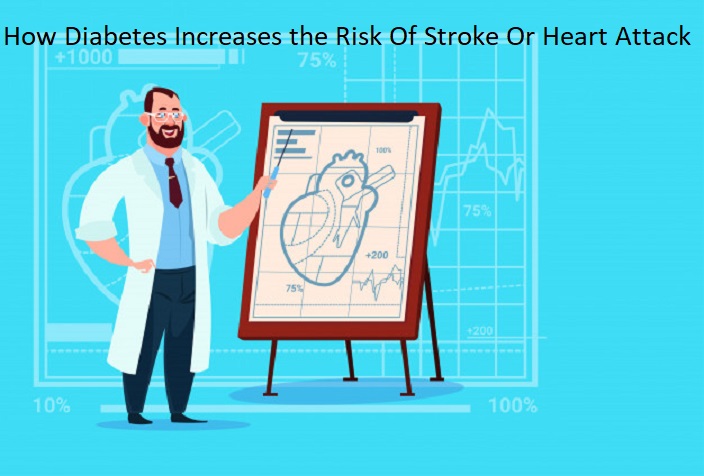

: Admin : 2019-09-04
According to several types of research conducted, patients with diabetes are at a high risk of developing cardiovascular diseases like hypercholesteremia, heart attack, and stroke among others. This is due to the fact that high levels of sugar in diabetes can cause damage to blood vessels and nerves that control the heart.
Patients suffering from diabetes are more prone to developing heart diseases as compared to others. One of the most common causes of death in stroke and heart diseases is diabetes.
If a person has diabetes, other factors add to chances of developing heart disease or having a stroke. The following factors can be considered:
Smoking raises the risk of developing heart disease. It also increases the chances of developing other long-term problems such as lung disease. Smoking also can damage the blood vessels in the legs and increase the risk of lower leg infections, ulcers, and amputation.
A person suffering from high blood pressure, it puts a pressure on the heart to pump blood at a faster rate. Thus high blood pressure puts a strain on heart, damage blood vessels, and increase risk of heart attack, stroke, eye problems, and kidney problems.
There are two types of cholesterol present in the body, i.e., HDL and LDL. LDL, also called bad cholesterol, can build up and clog blood vessels. High levels of LDL cholesterol raise the risk of developing heart disease. Another type of blood fat, triglycerides also can raise the risk of heart disease when the levels are higher.
Being overweight or obese can have an impact on the ability to manage diabetes and increase the risk of heart disease and high blood pressure. If a person is overweight, a healthy eating plan with reduced calories often will lower glucose levels and reduce the need for medications. Excess belly fat around the waist, even if a person is not overweight, can raise chances of developing heart disease. Even if a person is normal weight, excess belly fat can raise the risk of heart disease.
A family history of heart disease may also add to the chances of developing heart disease. If one or more of family members had a heart attack before age 50, a person may have an even higher chance of developing heart disease
Download the Meddco Healthcare App and compare Treatment and Healthcare Packages - https://play.google.com/store/apps/details?id=com.meddco&hl=en
Management of diabetes is important in order to take care of the heart. One can lower the chances of having a heart attack or stroke by taking the following steps to manage diabetes:
The A1C test shows an average blood glucose level over the past 3 months. Higher A1C number results in higher blood glucose levels during the past 3 months. High levels of blood glucose can harm the heart, blood vessels, kidneys, feet, and eyes. The target levels for A1C on an average for many people with diabetes is below 7%
High blood pressure can cause a heart attack or stroke and damage kidneys and eyes. The normal level of blood pressure for most people is below 140/90 mm Hg
For people over 40 years of age need to take medicine such as a statin to lower cholesterol and protect the heart. Some people with very high LDL cholesterol may need to take medicine at a younger age.
Quitting smoking may cause the following-
Eating a healthy diet and make regular exercise a part of daily routine, as well as lose weight. Get enough sleep each night.
Managing diabetes can be stressful; yet, feeling stressed or angry can raise blood glucose and blood pressure.
Medicines may be an important part of the treatment plan. Medicines may help in
Statins reduce the risk of a heart attack or stroke in patients with diabetes. Statins are a type of medicine often used to help people meet their cholesterol goals, It is not recommended to stop taking medicines without checking with a doctor first.
The warning signs of heart attack and stroke can be listed as follows:
Treatment in any condition works best when it is given right away. Warning signs can be different in different people.
Diabetes And Heart Attack Symptoms Diabetes And Heart Attack Diet Type 1 Diabetes And Heart Disease Cardiovascular Complications Of Heart Disease Diabetes And Stroke How Does Diabetes Affect Your Kidneys
No Comments